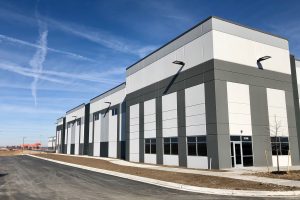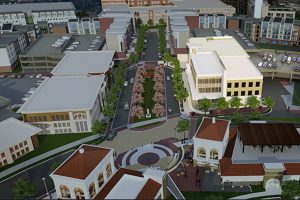Future is bright for 2019 KC real estate market
We’re now more than a month in, and not only am I still committed to my New Year’s resolution but I’m still excited about Kansas City commercial real estate in 2019.
For those of us in the industry, it’s all about analysis and projections. Although we don’t have a crystal ball to tell us which deals will perform better than others, every day we’re expected to predict the future.
I often hear the question, “How long will this expansionary market last?” Well, now that the new year is officially underway, it seemed like a good opportunity to pull back the curtain on what we expect from the Kansas City commercial real estate market in 2019 (and beyond).
Office
It shouldn’t be a surprise to anyone that we need more Class A office space downtown if we want to attract large, out-of-market corporate users, as punctuated by Nick Starling’s recent headline, “Lack of office space contributed to Starbucks not locating jobs to area.” Based on the cadence of large office space users evaluating Kansas City over the past few years, now is the time to evaluate just how strong downtown demand is and create options to meet the lead time for this demand.
On the flip side, the likely sale of the 4-million-square-foot Sprint campus and its excess space will have quite a ripple effect on office capacity across the metro, and we will be closely monitoring how it impacts the leasing market in 2019.
Nevertheless, Kansas City still needs more Class A office space, not just in urban areas but in the suburbs as well—and developers are addressing this. Businesses are no longer willing to wait three years for new ground-up, high-amenity office space in relatively dense locations, and we must be ready when the next major tenant comes knocking at our door.
Retail
Let’s get one thing straight: Retail is certainly not dead. Yes, the news is full of brick and mortar department stores closing and abandoned shopping malls. However, overall retail sales are up, and this sector is simply evolving.
We’re seeing retail growth in high-density, “destination-based” mixed-use environments, especially when shopping provides more of an experience than just a purchasing transaction. That often means additional specialty food and beverage options or finding a unique anchor – like an entertainment center or a sports complex – for these retail developments.
When Nordstrom moves to the Plaza, it will be unlikely for Oak Park Mall to backfill that huge space with another department store, at least not quickly. Instead, we expect to see a use type that adds something new to the retail experience—an attraction to draw new and repeat visitors to the area. The old Metro North Mall site is placing a bet by anchoring a new development around T-Shotz, a new golf entertainment complex similar to Topgolf. At City Center Lenexa, more retail developments are being planned because destination venues like the Lenexa Public Market and the Shawnee Mission School District Aquatics Center are driving the demand.
Yes, the rise of e-commerce has caused – and will continue to cause – a major shift in retail, but success in the future will be found through the experiences you just can’t get on a smartphone.
Multifamily
Similar to retail, new multifamily developments work best if two things exist: density and experience. These projects (which usually require their own retail to help drive demand) must be located around – and contribute to – an “experience” where people want to repeatedly visit to live, work and play.
We’re confident the demand for more multifamily absorption is still there. Many new single-family homes are out of reach for young professionals looking for entry-level houses, and many Baby Boomers are starting to look for different residential options. New multifamily developments have recently opened and are currently under development across the metro to help address these needs.
While we’re closely watching national trends and interest rates, we see strong continued demand for multifamily projects—if they meet those two requirements of density and experience.
Industrial
Due to the “Amazon effect,” e-commerce continues to grow at a rapid pace and businesses will continue to need warehouse space that puts them closer to consumers. Research supports the continued development of various industrial products across the metro, from the new CVS distribution center in Platte County to the massive Midwest Gateway in Edgerton.

Midwest Gateway
Nationally, in fact, warehouse spaces are considered a hot “emerging” market across the country in 2019, as Chris Pesce states in Forbes:
“The general year-over-year increase in online shopping has led to more businesses needing space for stock to ship both locally and nationally … There is also always the need for warehouse space for all of the service trades such as electrical, plumbing, HVAC and other contractors, which are trades that are always needed.”
In Kansas City, we project at least three to four more years of strong industrial growth and absorption, which translates to new jobs for our region.
KC real estate outlook remains strong for 2019
While confidence in the stock market and general economy this year may feel a bit shakier than previous years, our outlook and indicators project more continued real estate growth across the region. In fact, the Center for Economic Development and Business Research predicts employment growth of 1.5 percent for the Kansas City region (or about 16,000 new jobs), with the bulk of this coming from professional and business services, education and health sectors.
As we both witness and participate in the changing landscape of Kansas City and other parts of the region, we remain bullish on the commercial real estate outlook for 2019. Kansas City’s momentum is strong, and we don’t foresee any significant slowdown in the near future.
So, while we don’t have a crystal ball, the year ahead in Kansas City commercial real estate nevertheless looks promising indeed.
Brian Wietharn is president and chief operation officer at Copaken Brooks, a full-service commercial real estate firm headquartered in Kansas City and serving the Midwest. The company’s full suite of services includes: property management, construction management, leasing (office, medical, retail and industrial), investment acquisition and sales, tenant representation and HQ relocations, condo management, asset management, and development. Share your thoughts on our Facebook page or on Twitter @CopakenBrooks.









